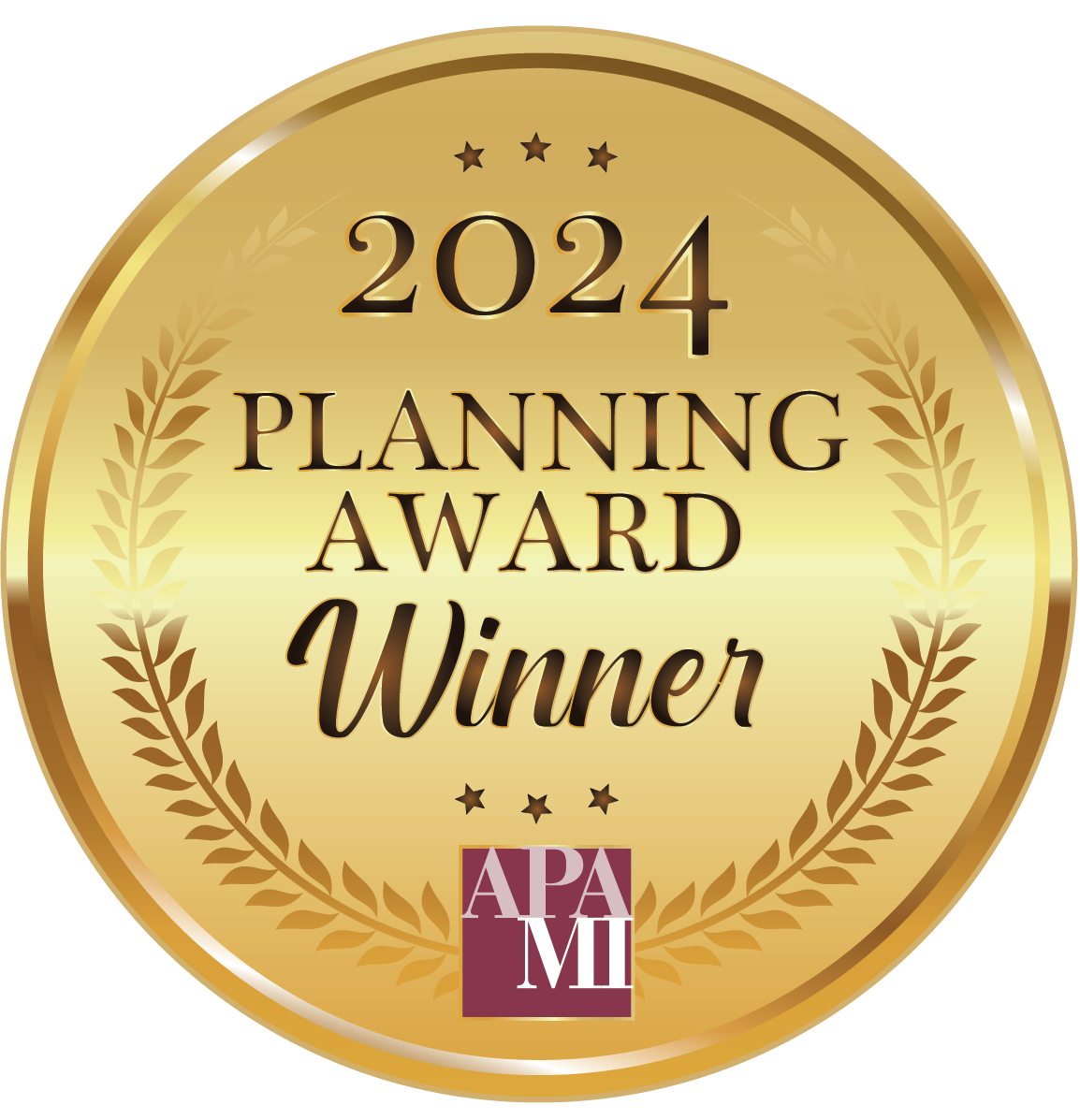
Ladybug Sustainable Community
DOWNLOADJune 12, 2024 - Oliver Gomez, Vivian Morales, Harrison Hill, Garrett Young, and Havien Gibson

This project received the 2024 Planning Excellence Award for Outstanding Student Project from the Michigan Association of Planning
The Ladybug Sustainable Community project in Lansing, Michigan, is a pioneering initiative aimed at creating an inclusive, environmentally sensitive urban agri-community. The proposed project seeks to address environmental challenges, foster community engagement, and promote sustainable development and regenerative practices. The report provides an overview of the project's goals, strategies, and recommendations, emphasizing the collaborative efforts and innovative approaches to create a sustainable and regenerative urban community.
The project engaged in extensive collaboration with key stakeholders, incorporating insights gained from discussions with various entities and considering the socio-economic characteristics of the community. The socioeconomic profile provides an overview of Churchill Gardens, including demographics, education, income, employment, housing, and transportation. Key findings include:
-
- Demographics: A gender shift occurred among the youngest population, with notable changes in age group populations between 2010 and 2022. The area experienced a population decrease, contrasting with state and county trends.
- Education: Educational attainment has fluctuated, with fewer residents holding a Bachelor's degree or higher.
- Income: Median household income increased significantly over the period, indicating economic growth, though it remains lower than broader regional averages.
- Employment: The employment rate in Churchill Gardens dipped slightly to 85.7%, indicating that most of the population remains employed. However, this is still the lowest rate when compared to larger regions such as Lansing, Ingham County, and the state of Michigan.
- Housing: Most housing units are single-family detached homes. Vacancy rates have gradually increased.
- Transportation: Commute times have aligned with regional averages over time, and driving alone remains the dominant mode of transportation.
- Crime: The area has seen fluctuating crime rates, with a notable reduction in the crime index by 2023.
The analysis of the site's current condition reveals it as an undeveloped area, largely forested, incorporating multiple wetlands, which are crucial considerations for any potential development endeavors.
The food access survey findings conducted in Churchill Gardens underscored generally favorable access to nutritious food and presented a diverse range of grocery spending and a moderate understanding of farm-to-table principles among residents. Moreover, a significant interest in local food cultivation emerged, suggesting potential for community-driven agriculture initiatives.
Our recommendations, devised through meticulous research and stakeholder engagement, are structured to effectively address identified challenges. They fall into two tiers: exploring alternative site selection due to constraints at the current location and proceeding with the site while implementing strategic measures to navigate its limitations.
Tier 1 Recommendations focus on the need for a larger area to accommodate the project's agricultural and housing needs, considering the current site's restrictions, such as wetland presence and limited developable space.
Tier 2 Recommendations encompass a range of strategies:
1. Wetlands Conservation: Advocating for sustainable interaction with the site's wetlands, including compliance with local ordinances and innovative mitigation strategies to preserve these vital ecological areas.
2. Soil Management: Tailoring soil management practices to enhance agricultural productivity across the site's diverse soil types, ensuring sustainable crop cultivation.
3. Infrastructure Enhancement: Incorporating efficient water management systems and sustainable construction practices, such as using renewable energy sources and green building materials, to support the community's ecological ethos.
4. Ecological Development: Addressing the challenges and constraints of carbon sequestration in an urban setting, emphasizing the need for innovative approaches to maximize environmental benefits.
5. Sustainable Construction Materials: This recommendation emphasizes the importance of choosing strategic materials and practices that boost environmental sustainability, improve water efficiency, and bolster ecosystem health in urban farming environments.
6. Housing Infrastructure: Highlighting the integration of modular homes to provide rapid, sustainable, and cost-effective housing solutions, aligning with the community's sustainable living principles.
7. Funding and Partnerships: Identify key funding sources and strategic partnerships with government agencies, educational institutions, and local organizations to secure the project's necessary resources.
8. Regulatory Compliance and Zoning: Navigating Lansing's zoning laws and building codes to ensure project alignment with local regulations and community standards.
9. Community Engagement and Urban Farming: Implementing comprehensive programs to educate and engage the community in sustainable agriculture, composting, and conservation practices.
10. Agri-Community Case Studies: Drawing on successful examples of agri-communities to inform and guide the development of the Ladybug Sustainable Community, incorporating best practices in organic farming, community design, and environmental stewardship.
By adopting these multifaceted recommendations, the Ladybug Sustainable Community project aspires to create a vibrant, sustainable agri-community that serves as a model for urban development, fostering a harmonious balance between human habitation and the natural environment.



 Print
Print Email
Email




